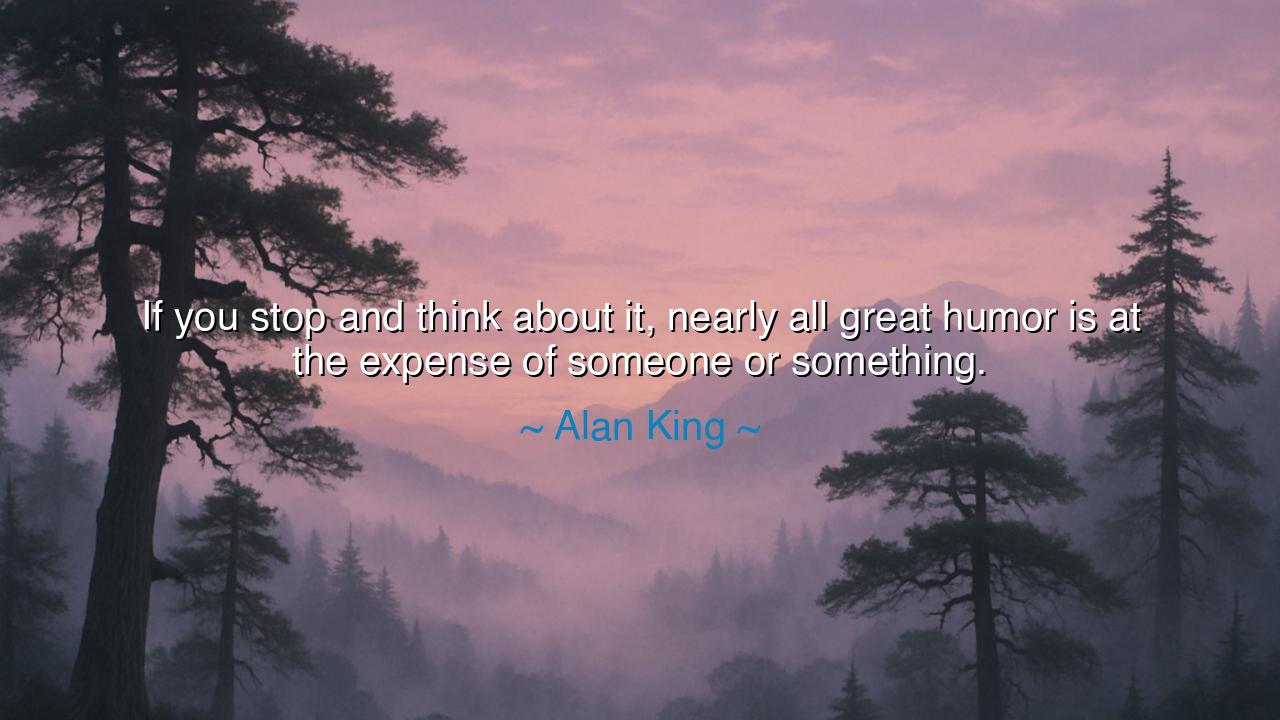
If you stop and think about it, nearly all great humor is at the
If you stop and think about it, nearly all great humor is at the expense of someone or something.






Hear, O Children of the Earth, the words of Alan King, who, in his great understanding of the human condition, declared: "If you stop and think about it, nearly all great humor is at the expense of someone or something." These words strike deep into the heart of truth, for they reveal a profound aspect of comedy and human nature itself. Humor, like all art, is born of conflict and contrast—it thrives in the tension between the ideal and the real, between the high and the low, the strong and the weak. Through the lens of laughter, we often find ourselves attacking or mocking the imperfections, flaws, and contradictions of the world around us. Let us explore these words, for they hold within them a key to understanding both the power and the dangers of humor.
What King suggests is that great humor, in its essence, requires a subject—something or someone to bring into focus and examine. The most powerful laughs are those that expose the weaknesses or absurdities in others. This truth is ancient and as old as the very nature of comedy itself. The great Aristophanes, whose comedies were filled with biting social commentary, understood this well. In his plays, he mocked the leaders of Athens, the gods, and even the very fabric of society. His humor, sharp and cutting, often came at the expense of the powerful, of those who held themselves above others. Through laughter, Aristophanes tore down the walls of authority, exposing the flaws beneath.
Consider the wisdom of Socrates, who, though not a comedian himself, used humor as a means of exposing ignorance in others. Through his ironic questioning, he led his interlocutors to see the contradictions in their own beliefs, forcing them to laugh at their own pretensions. Socrates often mocked the philosophers and sophists of his time, not with cruelty, but with humor that revealed their flaws. Mockery, then, can be a tool of wisdom, one that makes us laugh, but also forces us to reflect on our own limitations and misunderstandings. Through humor, we are made aware of our own foolishness, and in that recognition, we grow.
And yet, let us not be mistaken, O Children, for the humor that King speaks of is not always benign. Humor at the expense of others can be a weapon, a tool of destruction rather than enlightenment. We have all seen how mockery can turn cruel, how the laughter of one can wound the spirit of another. In the court of the Roman emperors, jesters often mocked the weak and the fallen for sport, their humor a reminder of the emperor’s absolute power. The laugh was not one of connection, but of dominance, a reminder of who controlled the narrative. Such humor is dangerous, for it lowers the dignity of others, and in doing so, it diminishes us all.
Consider the jesters of old, who, though granted a place in the courts of kings, often wielded their humor as a sword. Shakespeare's Fool, the character of King Lear, is a prime example. While the Fool in Lear is often the source of wisdom, his humor is cutting and often at the expense of the king’s pride. The Fool mocks Lear’s hubris, forcing him to confront his own delusions. Yet, the Fool’s humor is not without its risks. In making light of Lear’s authority, the Fool also walks a fine line between serving the king and undermining his power. The lesson here, O Children, is that humor, while it may bring clarity, can also undermine the structures that we hold dear, be they personal or societal.
In this light, the lesson to be learned from King's words is one of balance. Humor, when used with wisdom, has the power to both reveal and heal. It can expose the absurdities of life, bring laughter to our struggles, and force us to look at the world through new eyes. But when used recklessly, it can also harm, belittle, and diminish the worth of others. The key is to understand that laughter must not come at the cost of dignity. As we wield humor in our own lives, let us remember that we are not merely mocking others, but revealing the truths that lie beneath the surface of our shared humanity.
Therefore, O Children of the Earth, let us take this wisdom to heart: humor is a tool that requires great care. It is a means of connection, yes, but also of destruction. Let us use it to expose the follies of the world, but not to diminish the worth of those who walk beside us. Laughter is a light, but it must be used to uplift, not to wound. In our words and in our actions, let us strive to be wise in our use of humor, knowing that it is not the cost of others' dignity that makes us strong, but the ability to laugh together, to share in the beauty and absurdity of life without harm.






AAdministratorAdministrator
Welcome, honored guests. Please leave a comment, we will respond soon